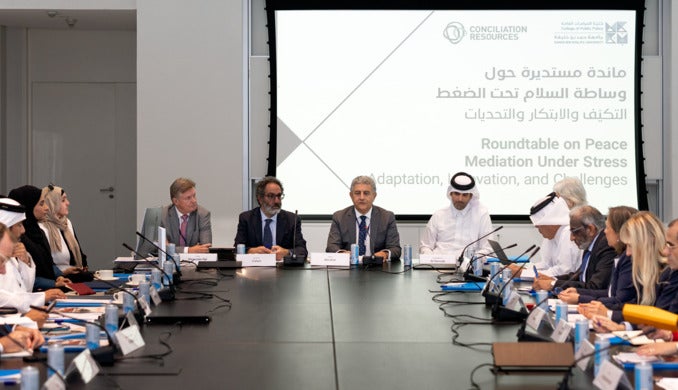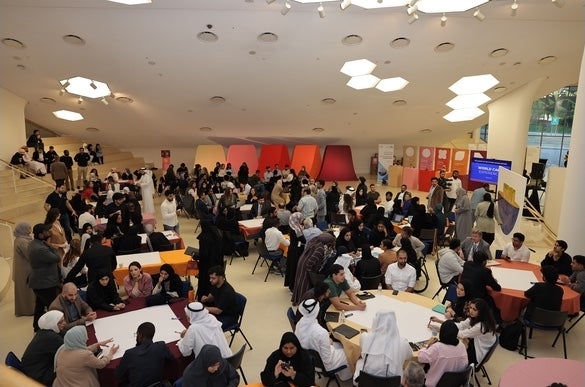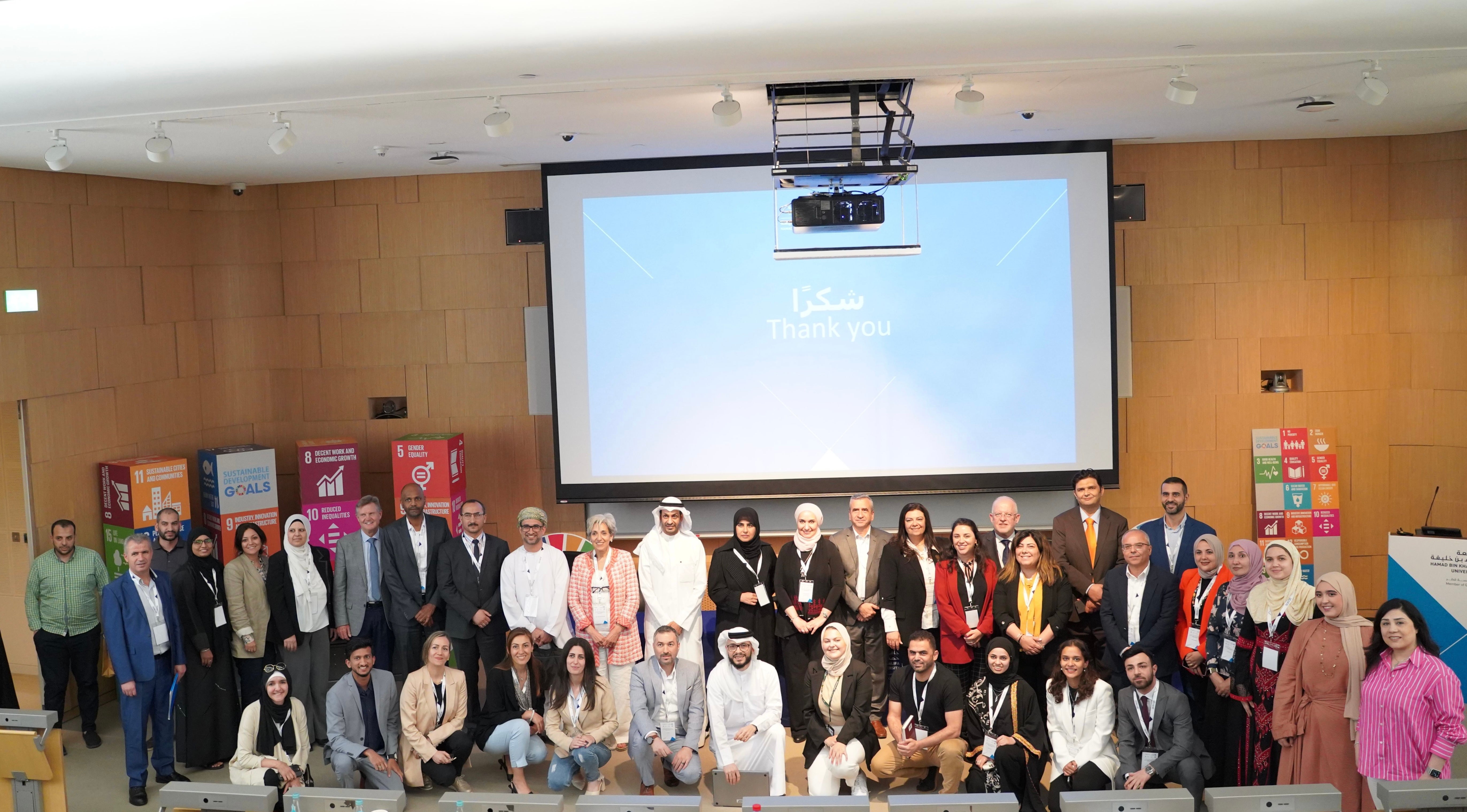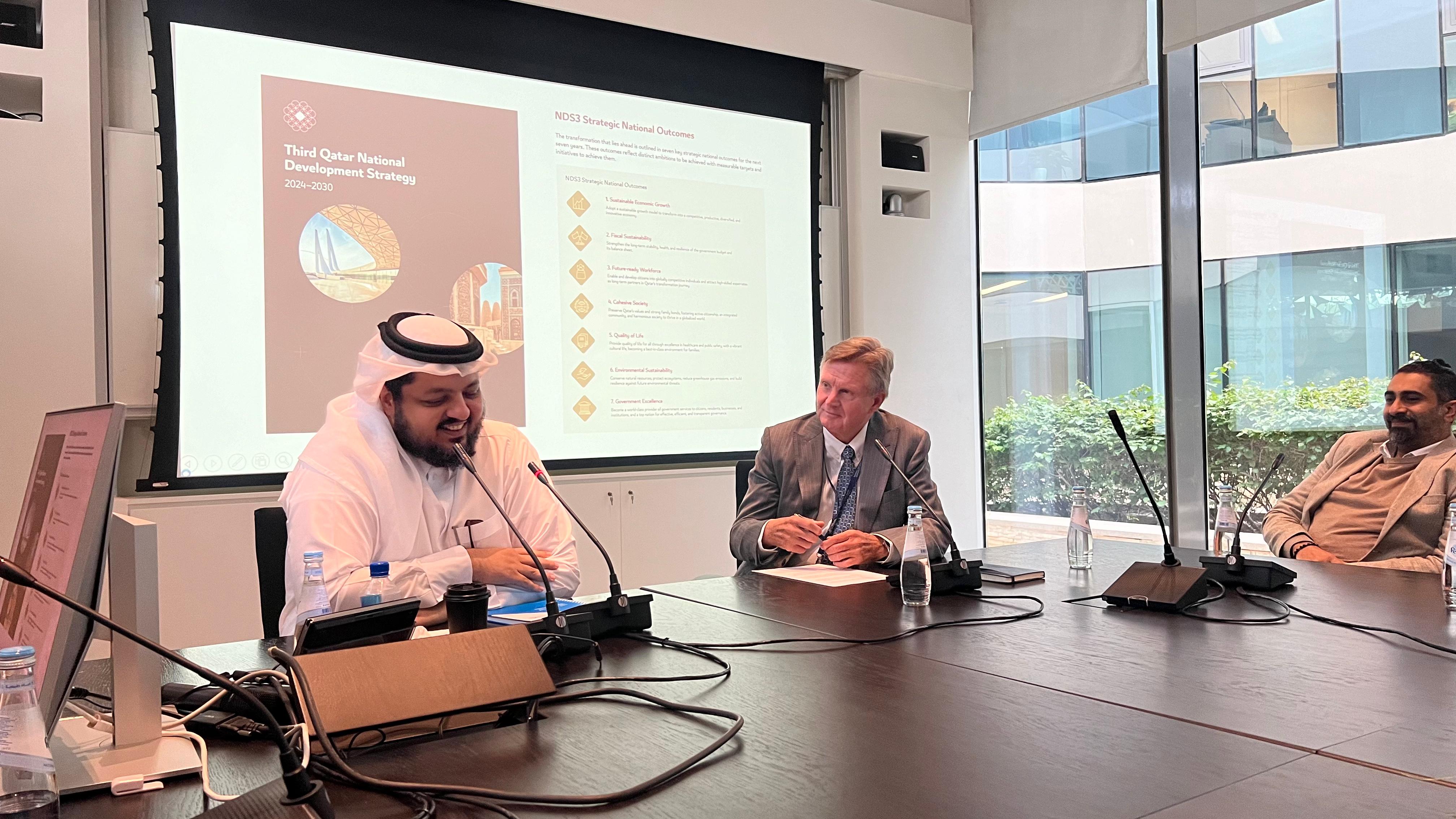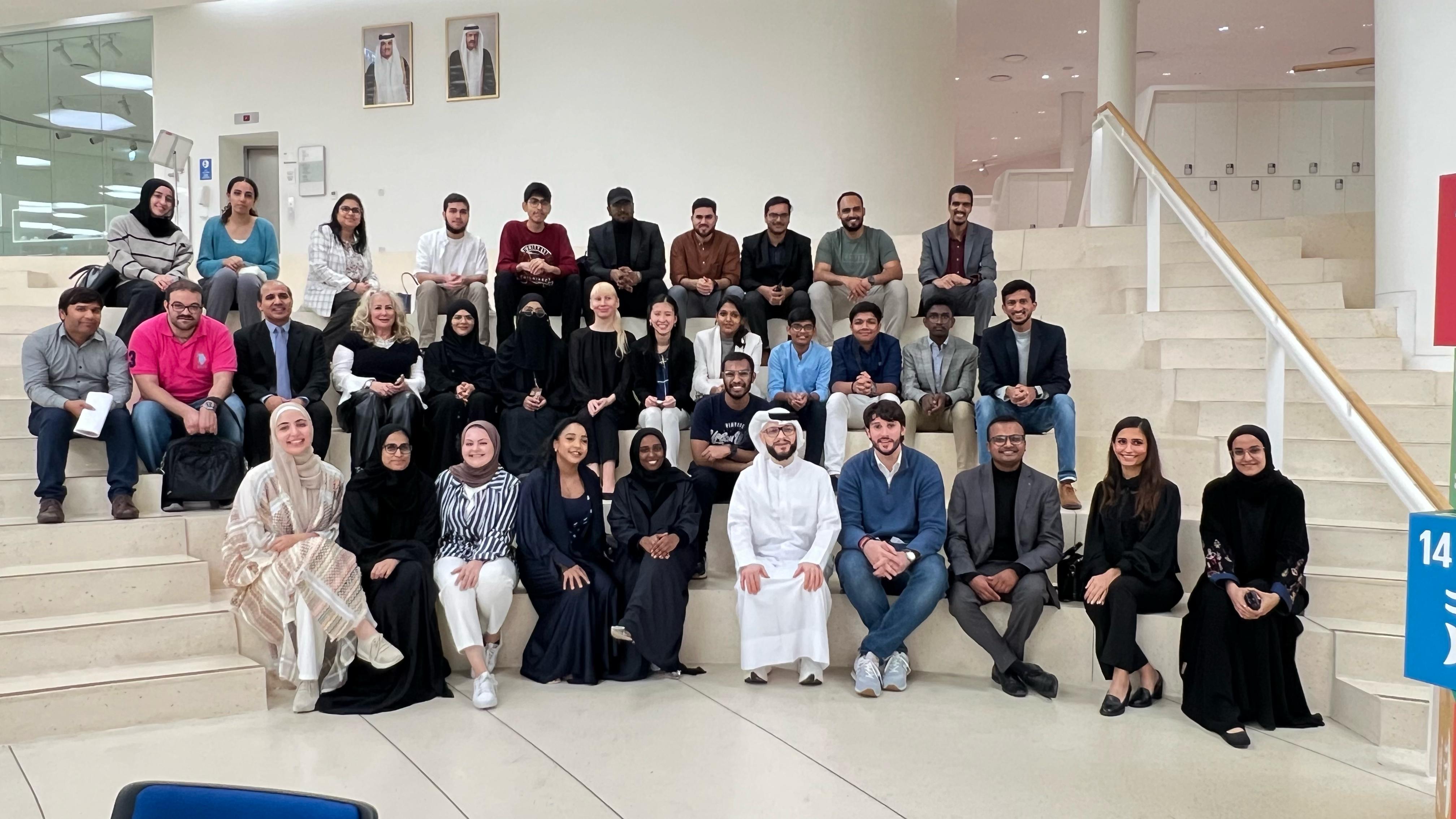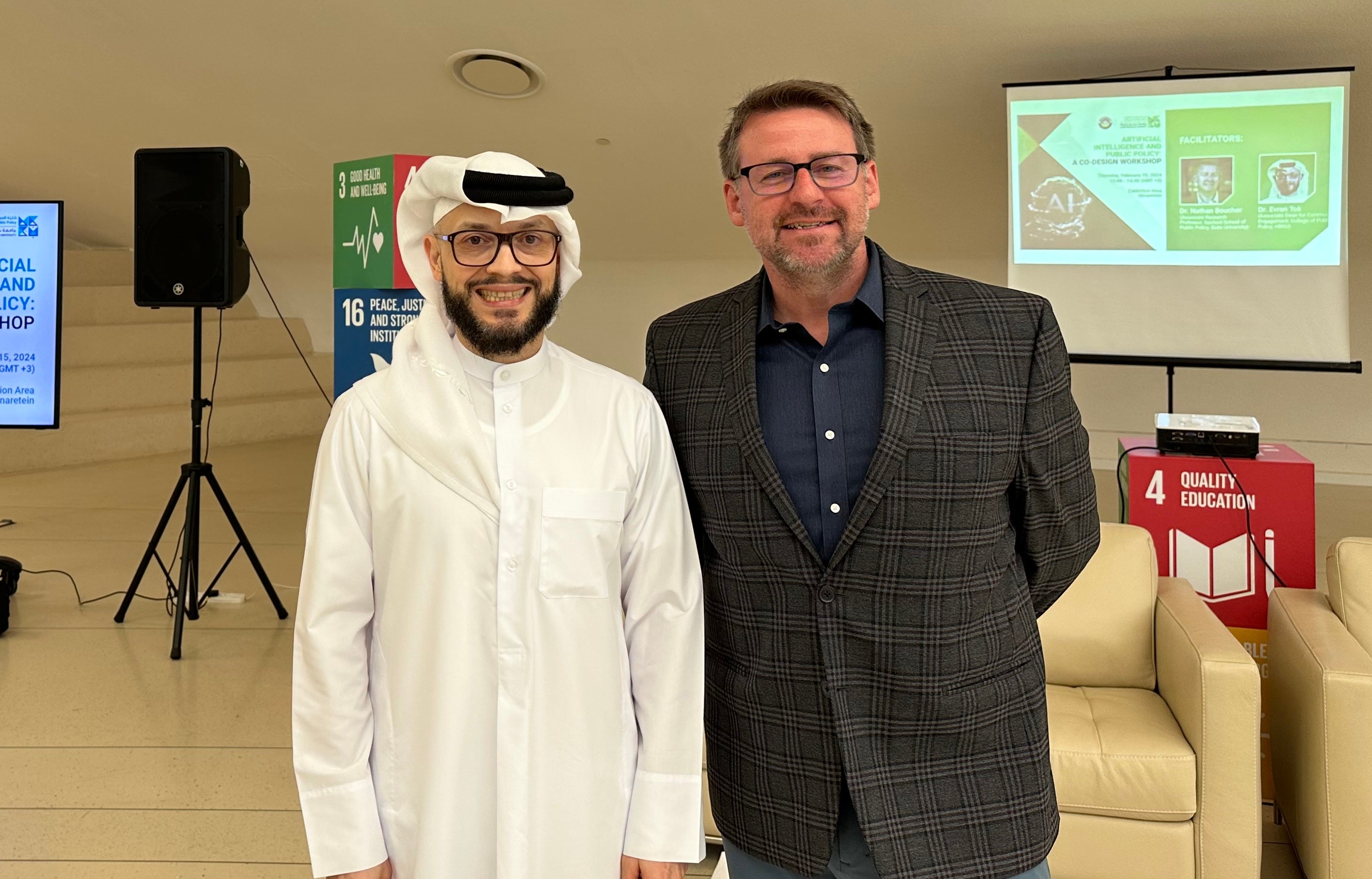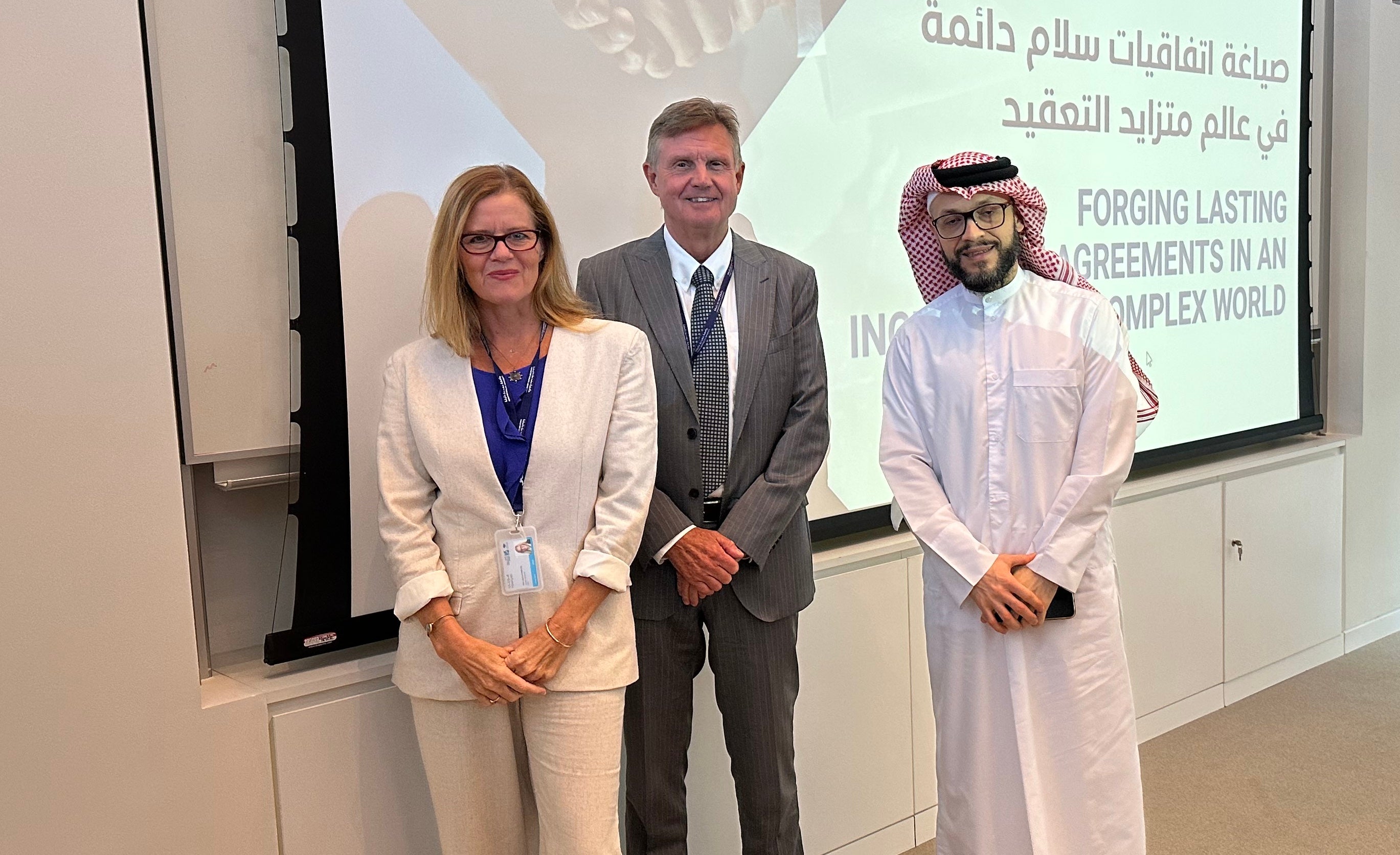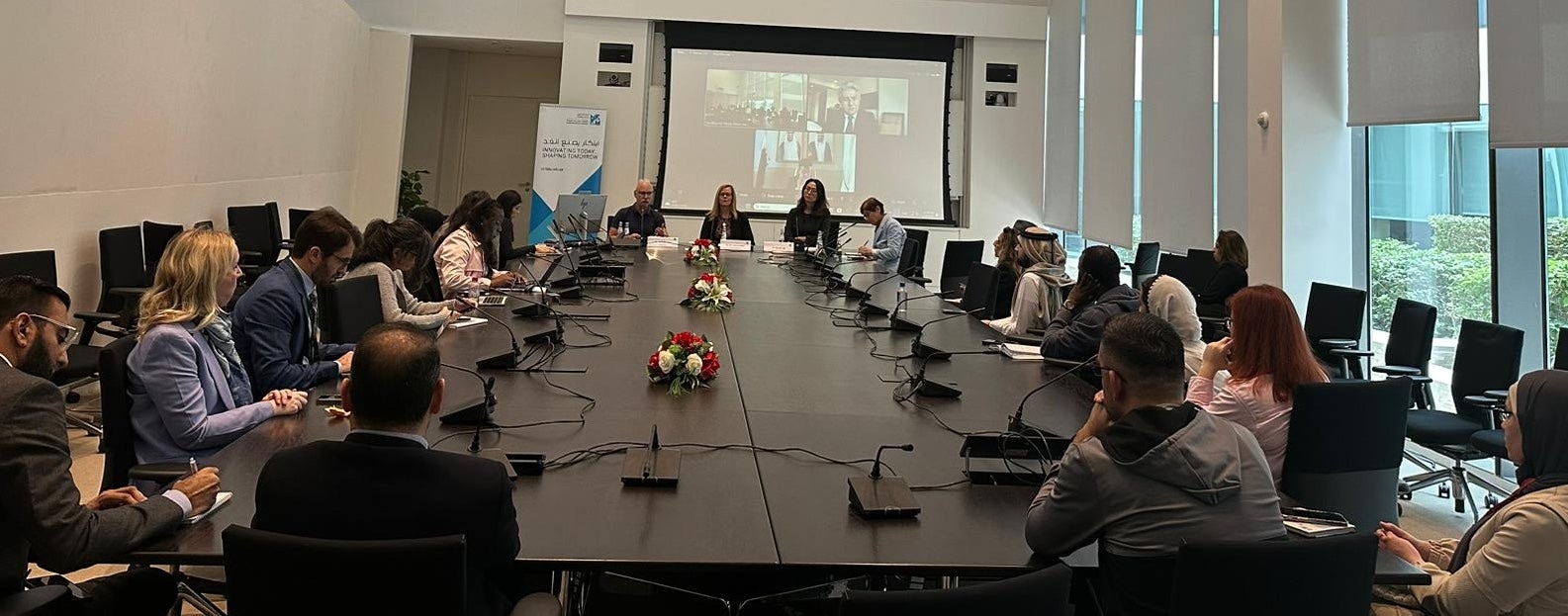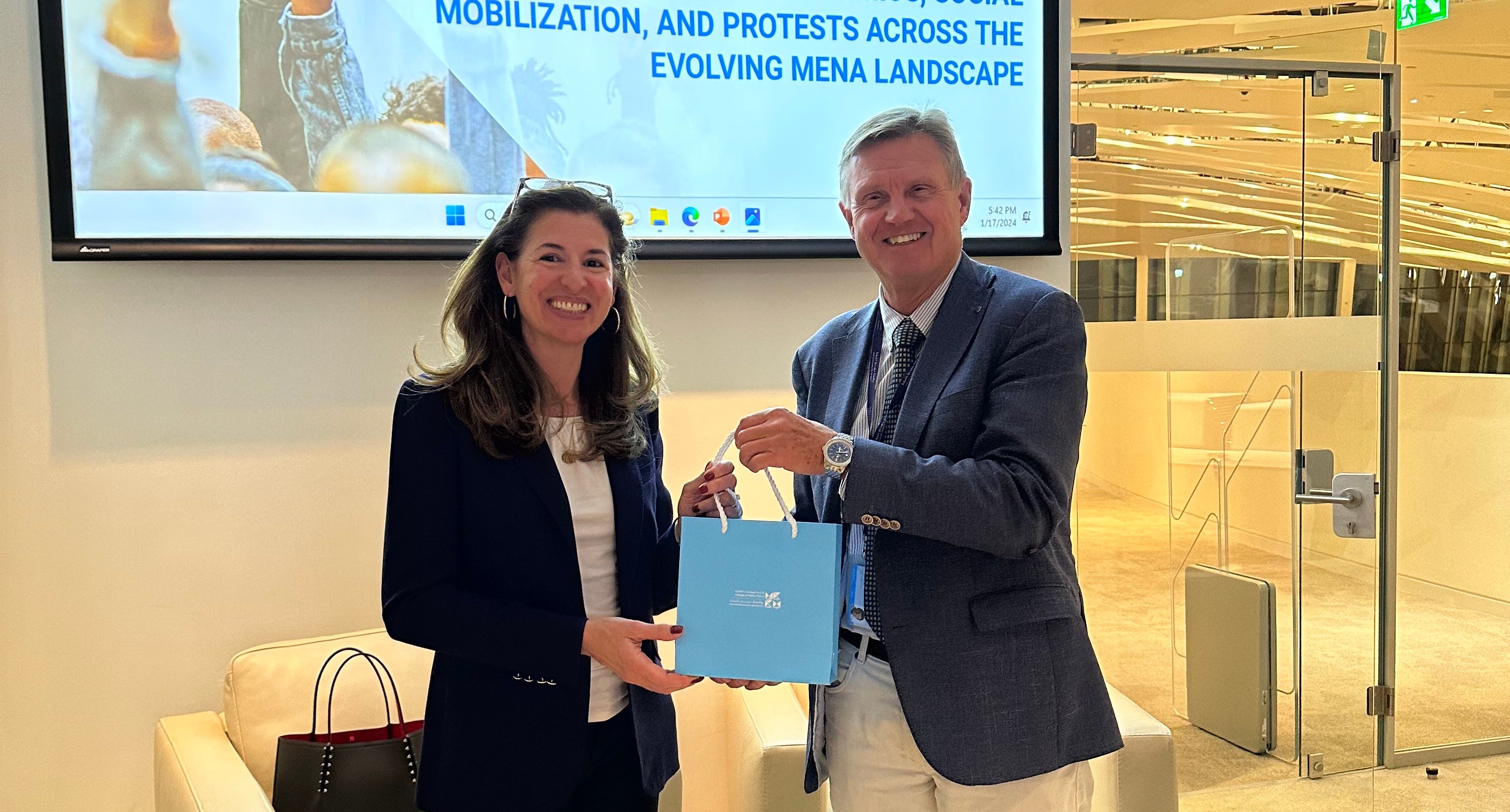
HBKU College of Public Policy Roundtable Considers Impact of Climate Change on Migration to Qatar
Event organized in partnership with International Organization for Migration
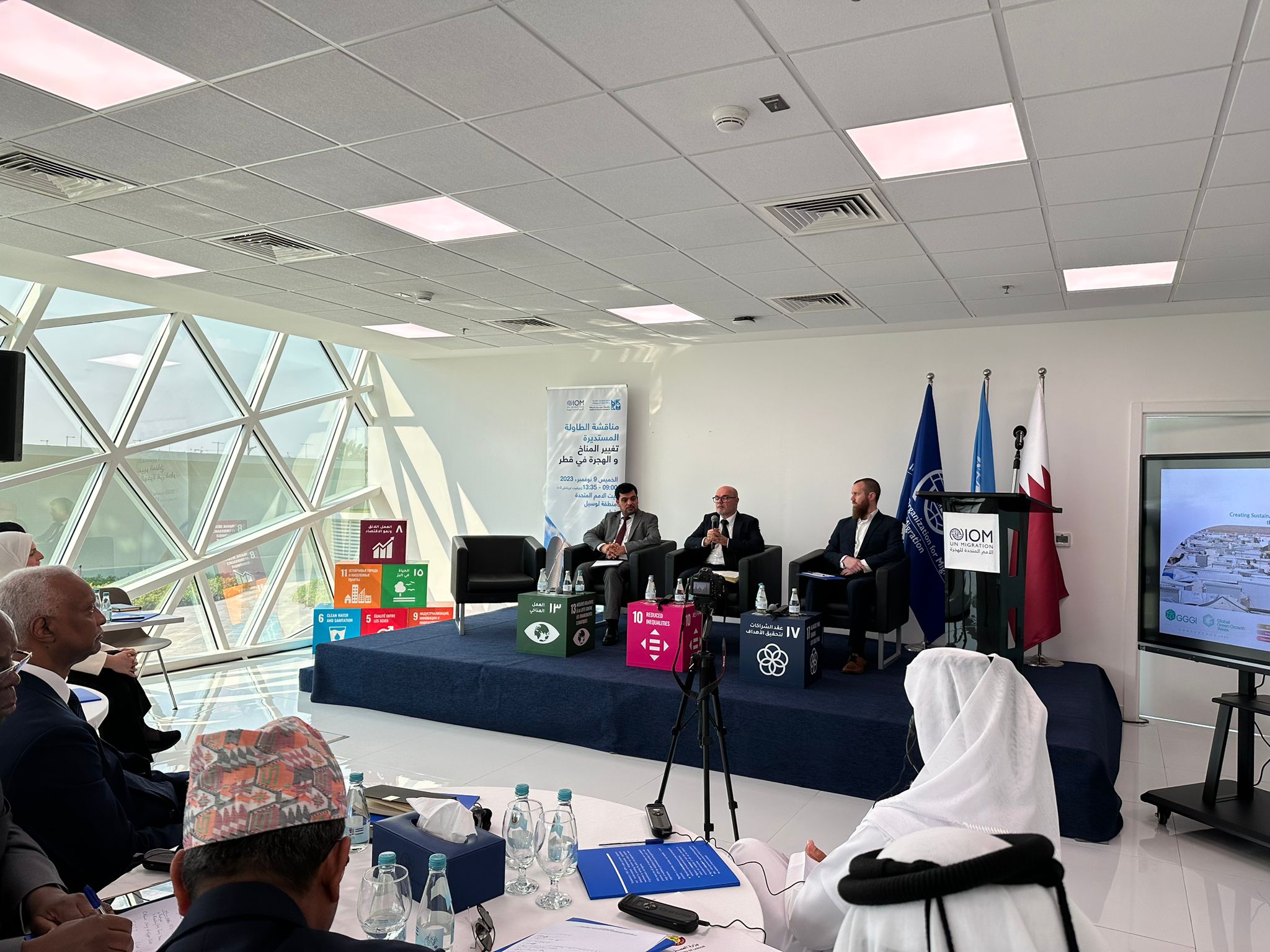
In line with its commitment to support policy development towards implementation of Qatar National Vision 2030, Hamad Bin Khalifa University’s (HBKU) College of Public Policy (CPP) recently staged a roundtable to consider the impact of climate change on migration into Qatar.
Co-organized with the International Organization for Migration Qatar (IOM Qatar), Climate Change and Migration in Qatar sought to deepen understanding of how climate change has become a potent driver of migration into the country. This was accompanied by key insights concerning the impact of climate change on migrant workers within Qatar and efforts to mitigate the most pernicious effects of increasingly unpredictable climatic conditions. Participants also reflected on Qatar’s priorities and participation at COP 28 in the United Arab Emirates.
Climate Change and Migration in Qatar commenced with opening remarks by Iman Ereiqat, Chief of Mission, IOM Qatar, and Dr. Leslie A. Pal, Founding Dean, CPP. This was followed by a panel including Mr. Ovais Sarmad, Board Member, Global Carbon Council and former Deputy Executive Secretary, UNFCCC; Ms. Carol Chouchani Cherfane, Cluster Leader, Climate Change and Natural Resources Sustainability Cluster, UNESCWA, Ministry of Environment, which considered the impact of climate change on migration to the wider Arab region. Further discussions were informed by a diverse mix of participants from academia, non-governmental organizations, policymakers, and key figures within Qatar’s public and private sectors. Proceedings concluded with a panel on the role funding might play in addressing the impacts of climate change and migration.
Reflecting on the event, Dr. Leslie A. Pal, said: “Migration remains an essential and welcome feature of Qatar’s social and economic development. However, there can be no denying that climate change is having a profound impact on migrants already here, as well as influencing the type of migrant interested in job opportunities within the country. Looking ahead, Qatar needs a public policy landscape that’s capable of navigating all challenges posed by climate change and migration. We’re confident that our panel discussion and participants will make a solid contribution to this endeavor.”
The College of Public Policy (CPP) accomplishes HBKU’s priority to contribute to effective policy development, evaluation and dialogue in support of QNV 2030. It provides a uniquely situated venue for public conversation in Qatar, and a center for teaching and researching responses to policy questions of local and global relevance.
Related News
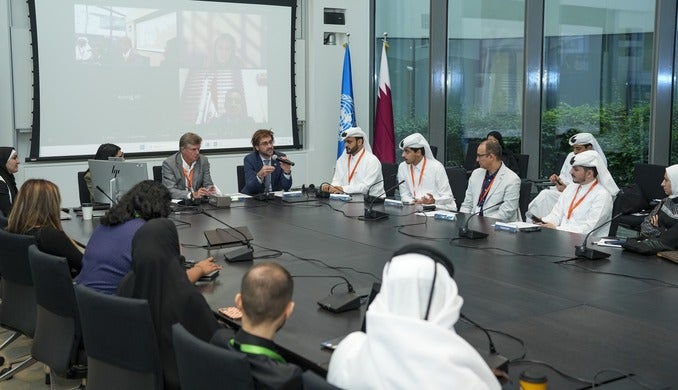
The United Nations Office of Counter-Terrorism and Leading Universities in Qatar Launch the Doha Youth Parliamentary Forum
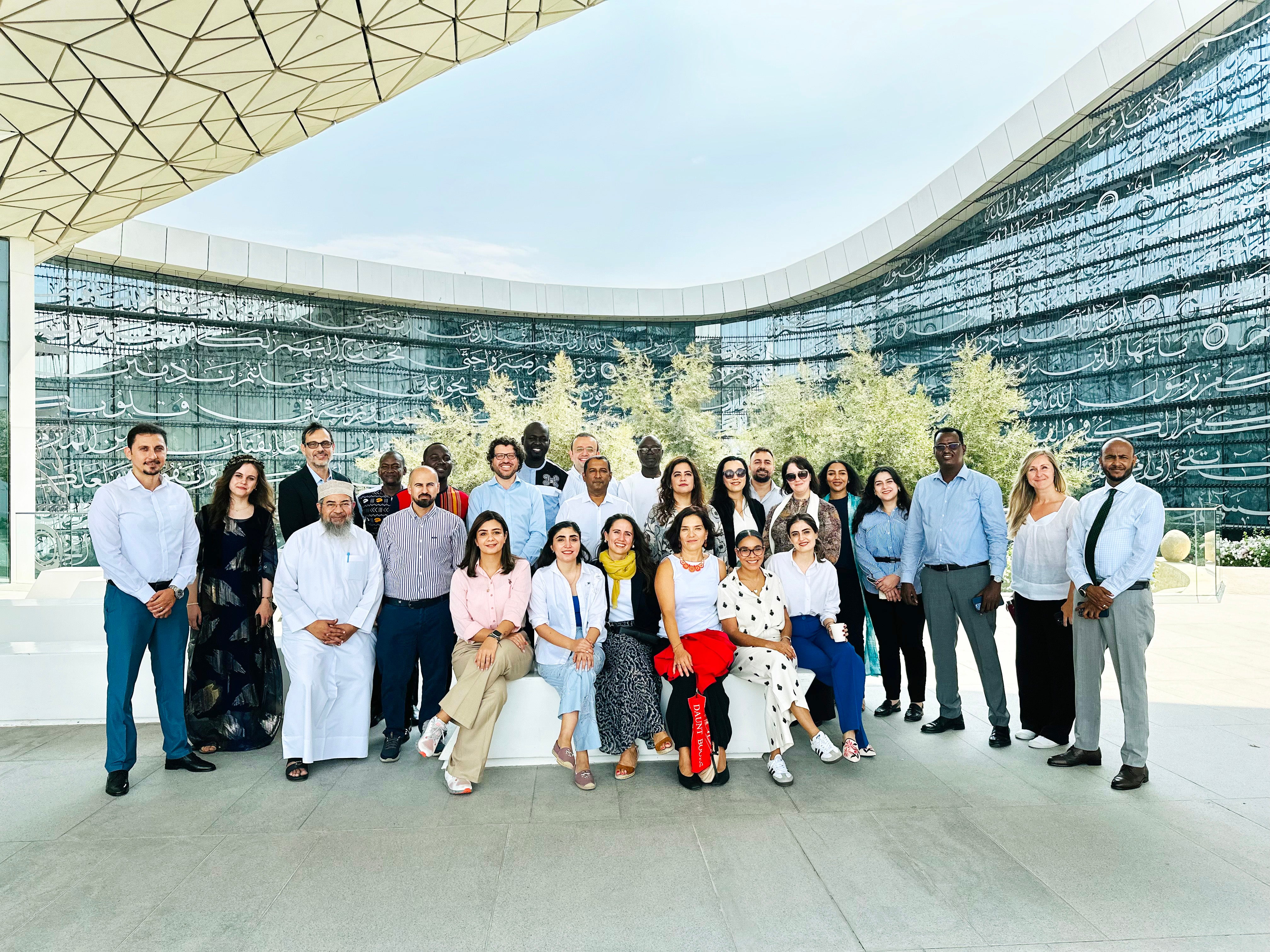
HBKU’s CPP and Geneva Graduate Institute Launch 2024-2025 Executive Programs in Development Policies and Practices
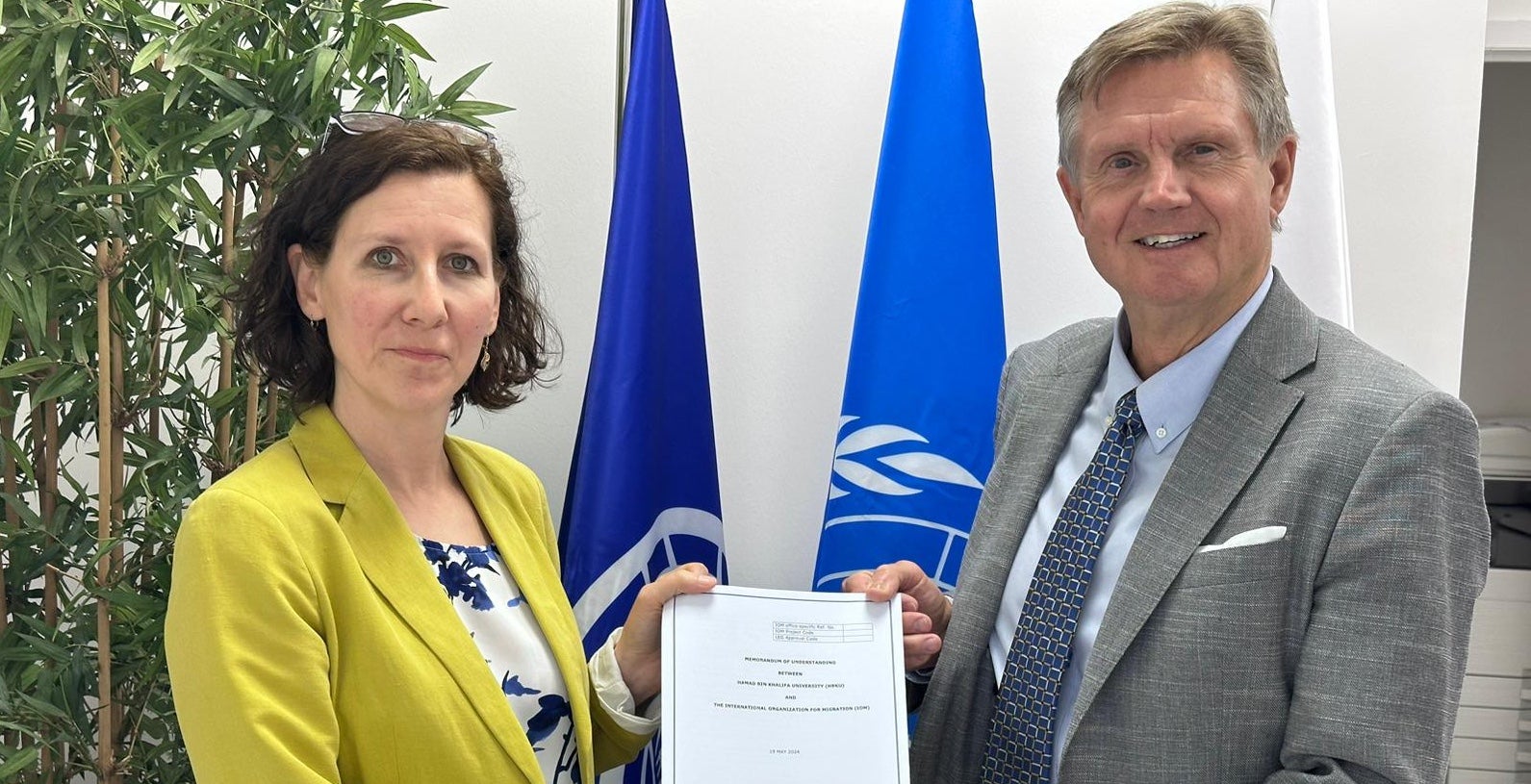
HBKU’s CPP Celebrates #TogetherinQatar Awards Ceremony after Signing MoU with the International Organization for Migration
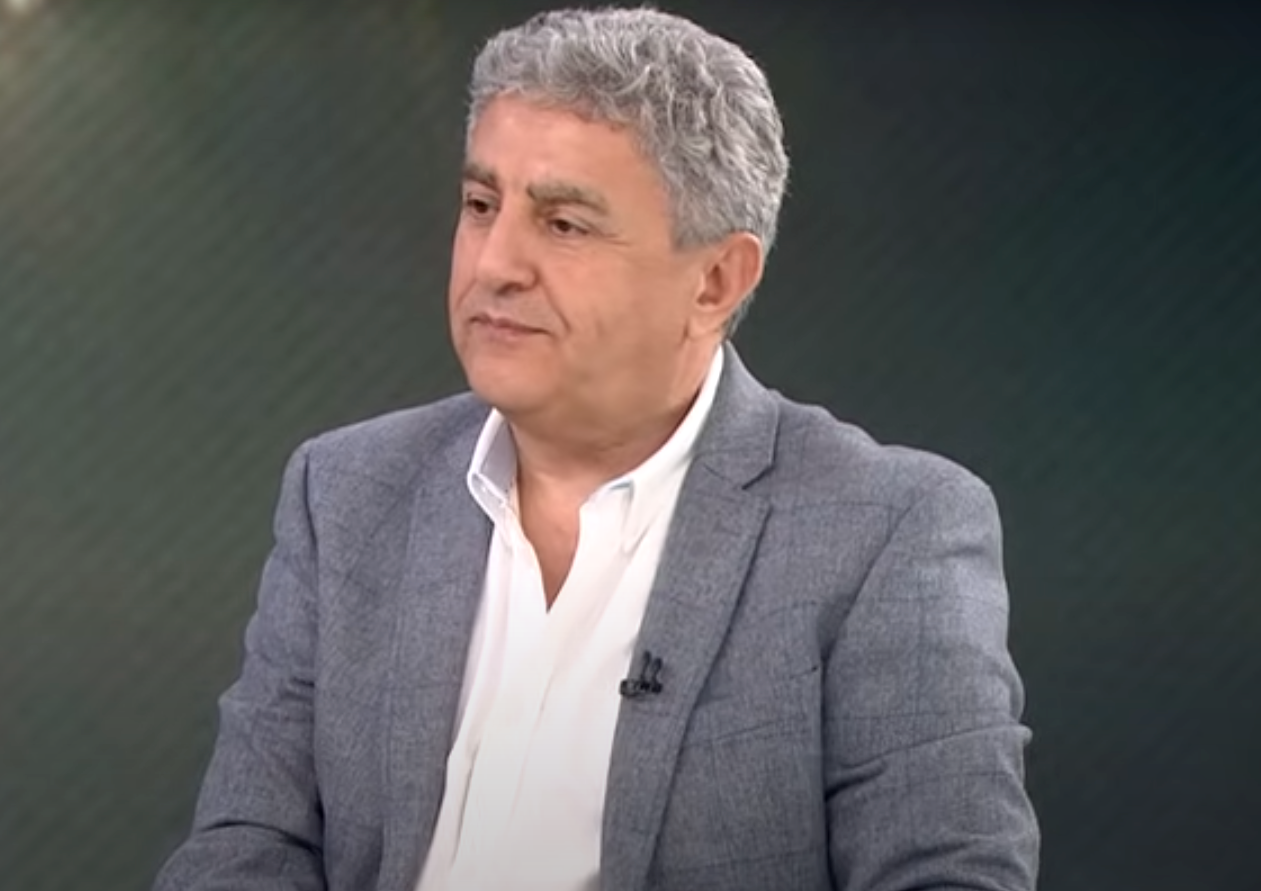
HBKU Professor Advises Global Policymakers on the Challenge of Engagement with the Taliban’s De-Facto Government
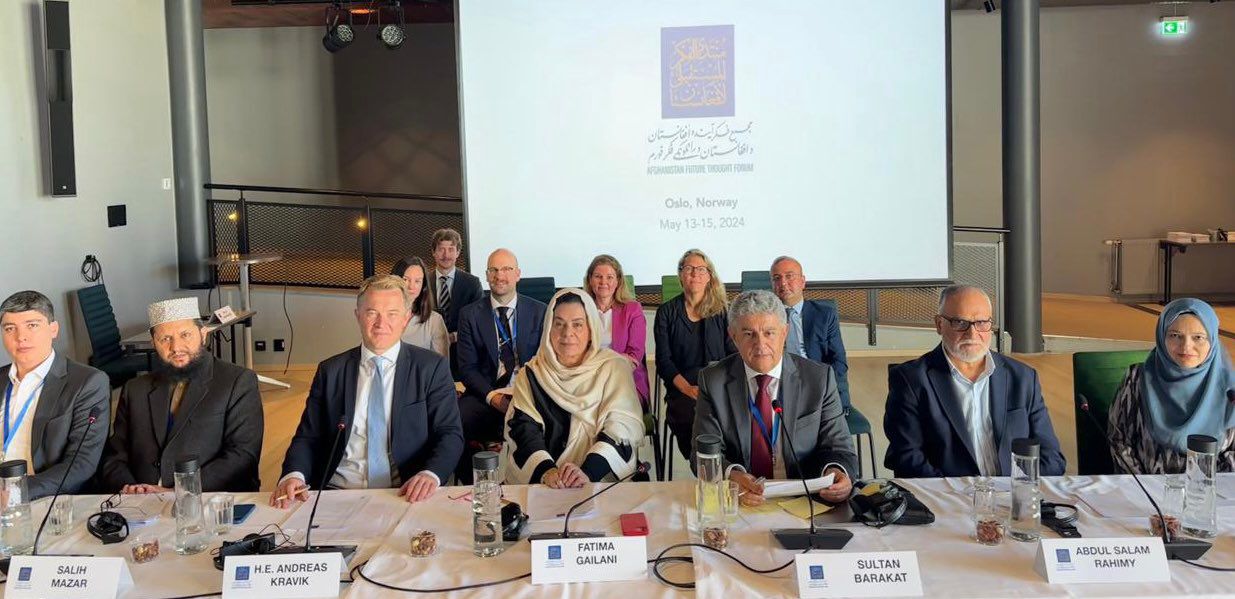
HBKU’s College of Public Policy Convenes the Ninth Session of the Afghanistan Future Thought Forum
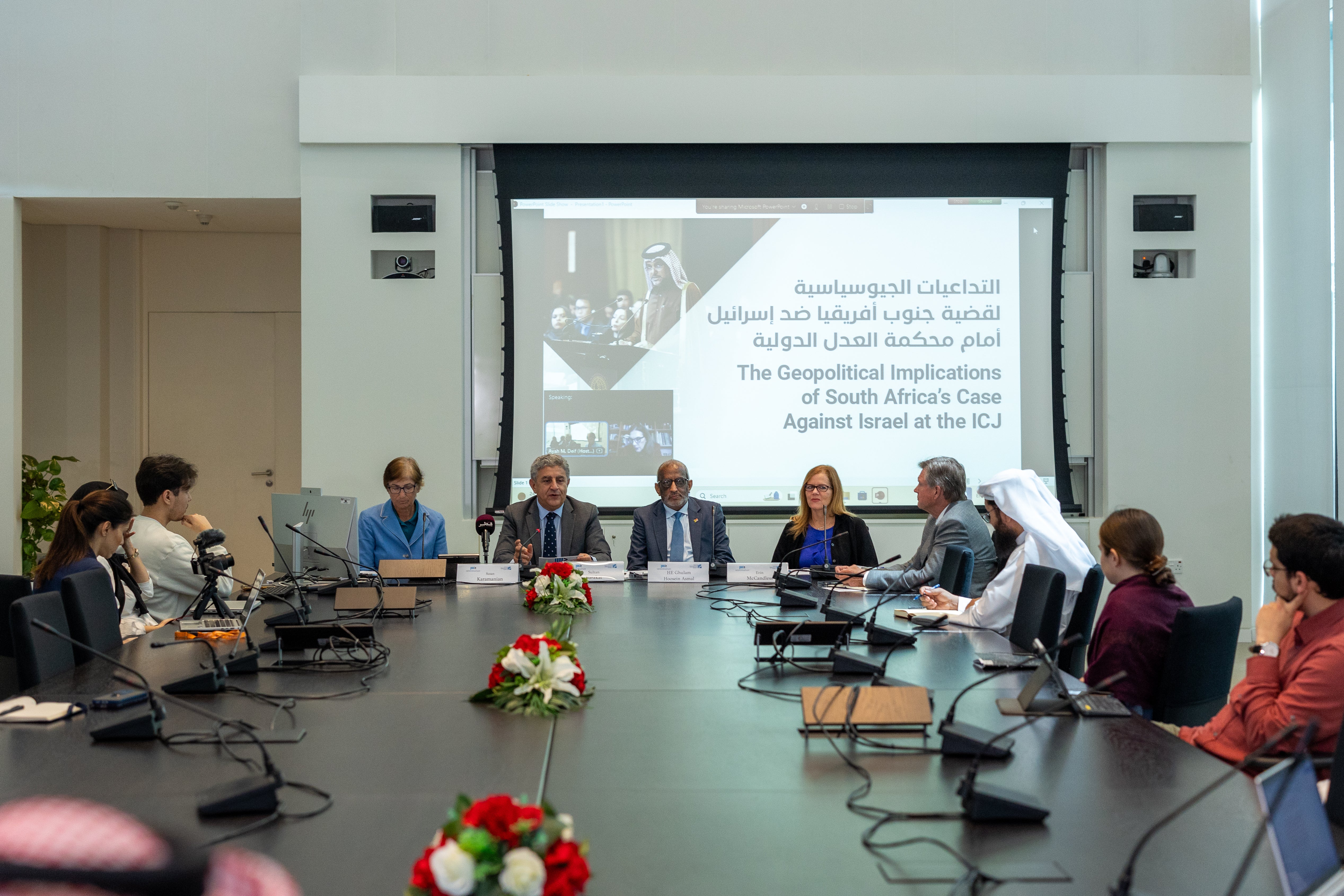
GISR Panel Analyzes Geopolitical Implications of South Africa’s Case against Israel at the ICJ
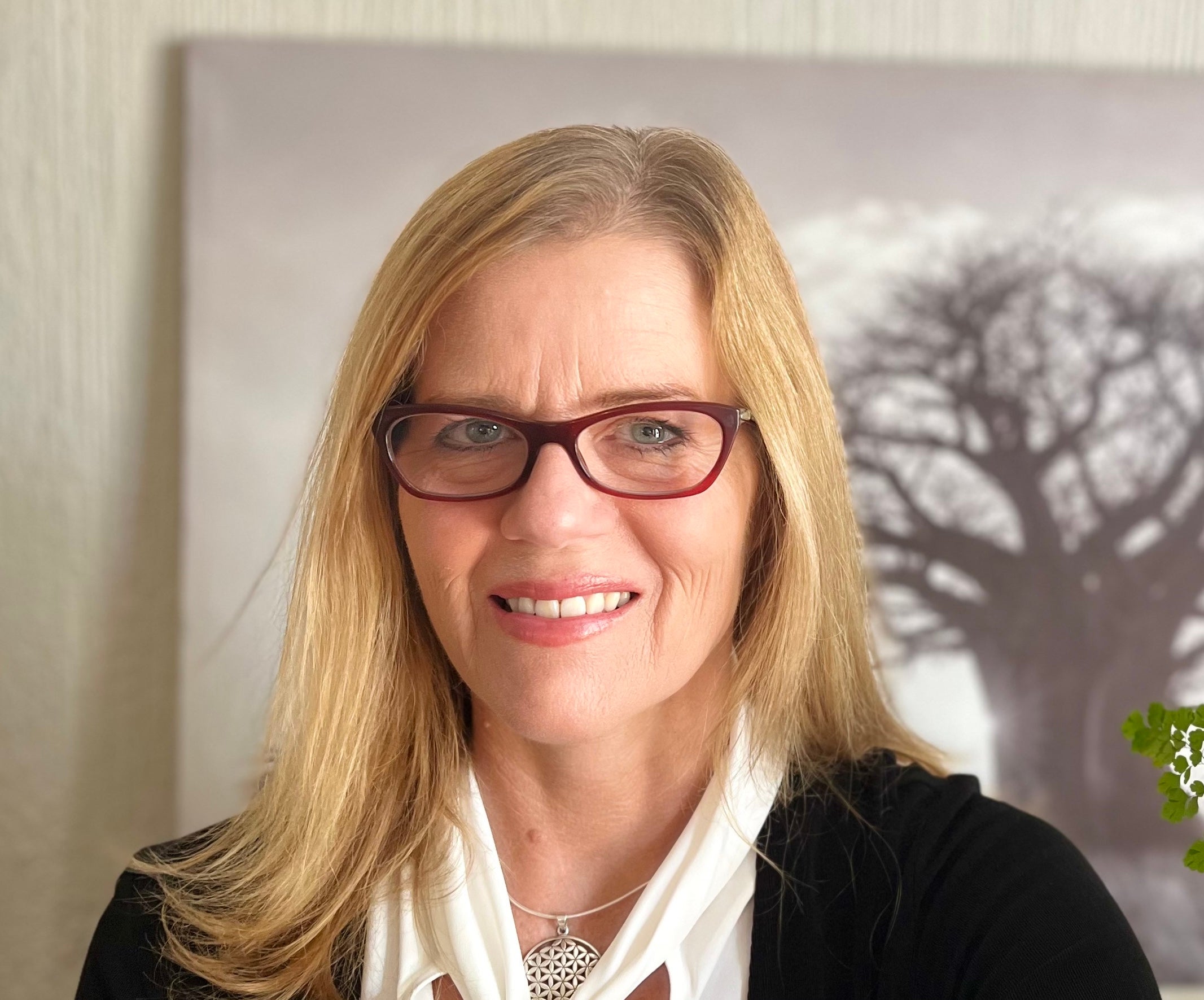
CPP Welcomes Erin McCandless as Distinguished Visiting Professor of Public Value
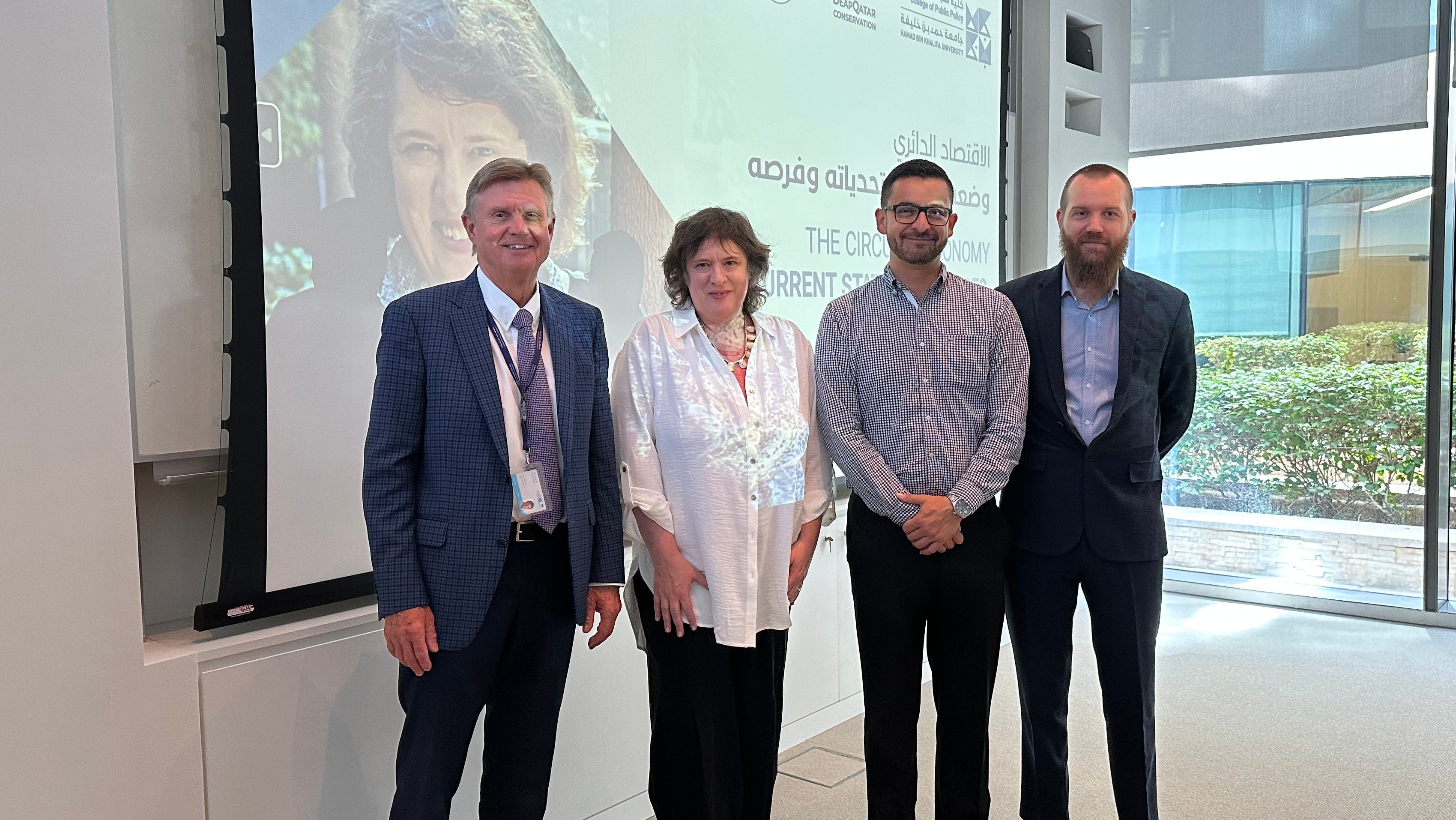
CPP, US Embassy in Doha, and DeapQatar Conservation Co-Host Circular Economy Lecture
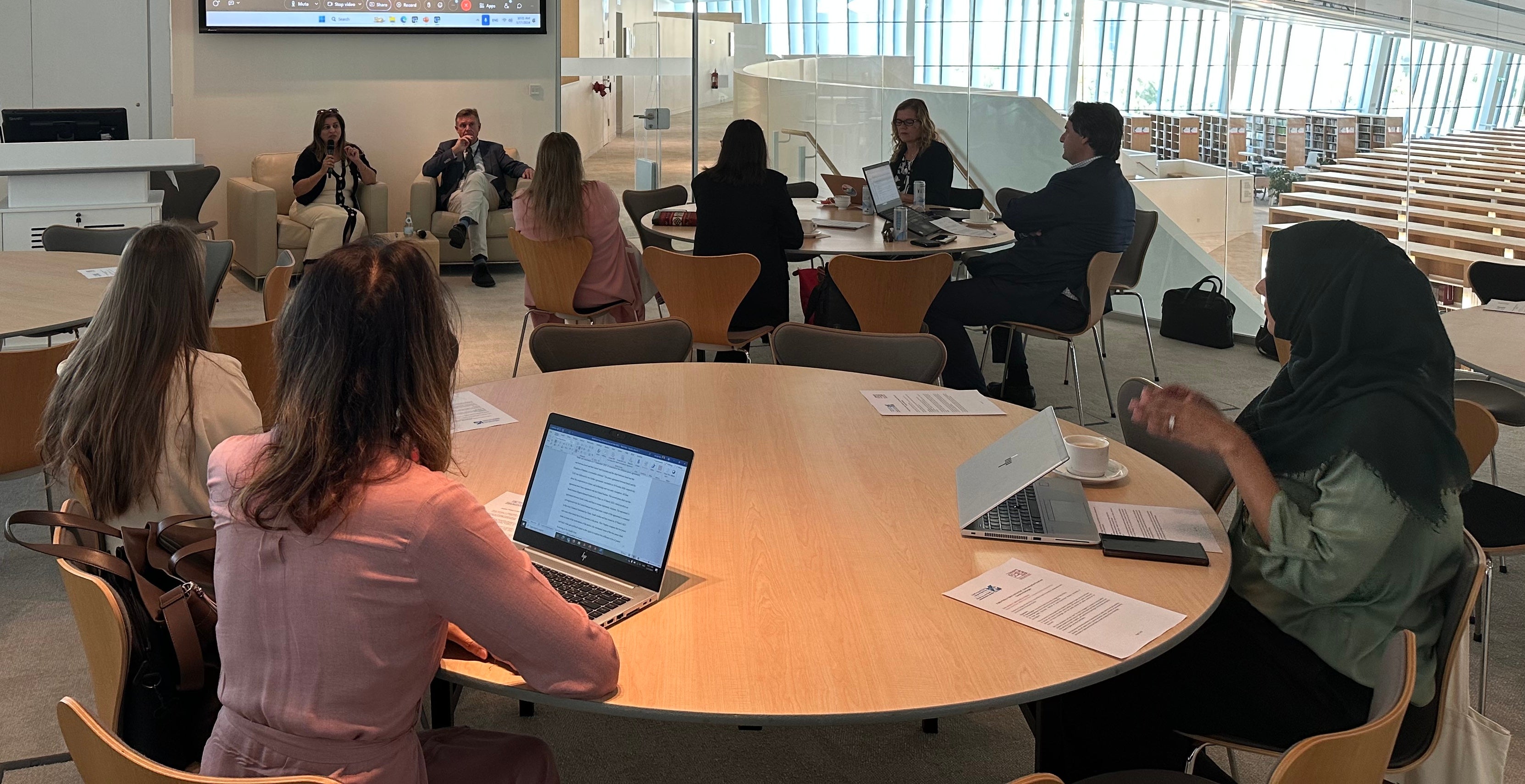
CPP, Doha Institute for Graduate Studies, and University of Birmingham Co-Host Symposium on Public Policy in the Gulf

The United Nations Office of Counter-Terrorism and Leading Universities in Qatar Launch the Doha Youth Parliamentary Forum

HBKU’s CPP and Geneva Graduate Institute Launch 2024-2025 Executive Programs in Development Policies and Practices

HBKU’s CPP Celebrates #TogetherinQatar Awards Ceremony after Signing MoU with the International Organization for Migration

HBKU Professor Advises Global Policymakers on the Challenge of Engagement with the Taliban’s De-Facto Government

HBKU’s College of Public Policy Convenes the Ninth Session of the Afghanistan Future Thought Forum

GISR Panel Analyzes Geopolitical Implications of South Africa’s Case against Israel at the ICJ

CPP Welcomes Erin McCandless as Distinguished Visiting Professor of Public Value

CPP, US Embassy in Doha, and DeapQatar Conservation Co-Host Circular Economy Lecture

CPP, Doha Institute for Graduate Studies, and University of Birmingham Co-Host Symposium on Public Policy in the Gulf

The United Nations Office of Counter-Terrorism and Leading Universities in Qatar Launch the Doha Youth Parliamentary Forum

HBKU’s CPP and Geneva Graduate Institute Launch 2024-2025 Executive Programs in Development Policies and Practices

HBKU’s CPP Celebrates #TogetherinQatar Awards Ceremony after Signing MoU with the International Organization for Migration

HBKU Professor Advises Global Policymakers on the Challenge of Engagement with the Taliban’s De-Facto Government

HBKU’s College of Public Policy Convenes the Ninth Session of the Afghanistan Future Thought Forum

GISR Panel Analyzes Geopolitical Implications of South Africa’s Case against Israel at the ICJ

CPP Welcomes Erin McCandless as Distinguished Visiting Professor of Public Value

CPP, US Embassy in Doha, and DeapQatar Conservation Co-Host Circular Economy Lecture

CPP, Doha Institute for Graduate Studies, and University of Birmingham Co-Host Symposium on Public Policy in the Gulf

The United Nations Office of Counter-Terrorism and Leading Universities in Qatar Launch the Doha Youth Parliamentary Forum

HBKU’s CPP and Geneva Graduate Institute Launch 2024-2025 Executive Programs in Development Policies and Practices

HBKU’s CPP Celebrates #TogetherinQatar Awards Ceremony after Signing MoU with the International Organization for Migration

HBKU Professor Advises Global Policymakers on the Challenge of Engagement with the Taliban’s De-Facto Government

HBKU’s College of Public Policy Convenes the Ninth Session of the Afghanistan Future Thought Forum

GISR Panel Analyzes Geopolitical Implications of South Africa’s Case against Israel at the ICJ

CPP Welcomes Erin McCandless as Distinguished Visiting Professor of Public Value

CPP, US Embassy in Doha, and DeapQatar Conservation Co-Host Circular Economy Lecture

CPP, Doha Institute for Graduate Studies, and University of Birmingham Co-Host Symposium on Public Policy in the Gulf

The United Nations Office of Counter-Terrorism and Leading Universities in Qatar Launch the Doha Youth Parliamentary Forum

HBKU’s CPP and Geneva Graduate Institute Launch 2024-2025 Executive Programs in Development Policies and Practices

HBKU’s CPP Celebrates #TogetherinQatar Awards Ceremony after Signing MoU with the International Organization for Migration

HBKU Professor Advises Global Policymakers on the Challenge of Engagement with the Taliban’s De-Facto Government

HBKU’s College of Public Policy Convenes the Ninth Session of the Afghanistan Future Thought Forum

GISR Panel Analyzes Geopolitical Implications of South Africa’s Case against Israel at the ICJ

CPP Welcomes Erin McCandless as Distinguished Visiting Professor of Public Value

CPP, US Embassy in Doha, and DeapQatar Conservation Co-Host Circular Economy Lecture

CPP, Doha Institute for Graduate Studies, and University of Birmingham Co-Host Symposium on Public Policy in the Gulf

The United Nations Office of Counter-Terrorism and Leading Universities in Qatar Launch the Doha Youth Parliamentary Forum

HBKU’s CPP and Geneva Graduate Institute Launch 2024-2025 Executive Programs in Development Policies and Practices

HBKU’s CPP Celebrates #TogetherinQatar Awards Ceremony after Signing MoU with the International Organization for Migration

HBKU Professor Advises Global Policymakers on the Challenge of Engagement with the Taliban’s De-Facto Government

HBKU’s College of Public Policy Convenes the Ninth Session of the Afghanistan Future Thought Forum

GISR Panel Analyzes Geopolitical Implications of South Africa’s Case against Israel at the ICJ

CPP Welcomes Erin McCandless as Distinguished Visiting Professor of Public Value

CPP, US Embassy in Doha, and DeapQatar Conservation Co-Host Circular Economy Lecture

CPP, Doha Institute for Graduate Studies, and University of Birmingham Co-Host Symposium on Public Policy in the Gulf

The United Nations Office of Counter-Terrorism and Leading Universities in Qatar Launch the Doha Youth Parliamentary Forum

HBKU’s CPP and Geneva Graduate Institute Launch 2024-2025 Executive Programs in Development Policies and Practices

HBKU’s CPP Celebrates #TogetherinQatar Awards Ceremony after Signing MoU with the International Organization for Migration

HBKU Professor Advises Global Policymakers on the Challenge of Engagement with the Taliban’s De-Facto Government

HBKU’s College of Public Policy Convenes the Ninth Session of the Afghanistan Future Thought Forum

GISR Panel Analyzes Geopolitical Implications of South Africa’s Case against Israel at the ICJ

CPP Welcomes Erin McCandless as Distinguished Visiting Professor of Public Value

CPP, US Embassy in Doha, and DeapQatar Conservation Co-Host Circular Economy Lecture

CPP, Doha Institute for Graduate Studies, and University of Birmingham Co-Host Symposium on Public Policy in the Gulf

The United Nations Office of Counter-Terrorism and Leading Universities in Qatar Launch the Doha Youth Parliamentary Forum

HBKU’s CPP and Geneva Graduate Institute Launch 2024-2025 Executive Programs in Development Policies and Practices

HBKU’s CPP Celebrates #TogetherinQatar Awards Ceremony after Signing MoU with the International Organization for Migration

HBKU Professor Advises Global Policymakers on the Challenge of Engagement with the Taliban’s De-Facto Government

HBKU’s College of Public Policy Convenes the Ninth Session of the Afghanistan Future Thought Forum

GISR Panel Analyzes Geopolitical Implications of South Africa’s Case against Israel at the ICJ

CPP Welcomes Erin McCandless as Distinguished Visiting Professor of Public Value

CPP, US Embassy in Doha, and DeapQatar Conservation Co-Host Circular Economy Lecture

CPP, Doha Institute for Graduate Studies, and University of Birmingham Co-Host Symposium on Public Policy in the Gulf

The United Nations Office of Counter-Terrorism and Leading Universities in Qatar Launch the Doha Youth Parliamentary Forum

HBKU’s CPP and Geneva Graduate Institute Launch 2024-2025 Executive Programs in Development Policies and Practices

HBKU’s CPP Celebrates #TogetherinQatar Awards Ceremony after Signing MoU with the International Organization for Migration

HBKU Professor Advises Global Policymakers on the Challenge of Engagement with the Taliban’s De-Facto Government

HBKU’s College of Public Policy Convenes the Ninth Session of the Afghanistan Future Thought Forum

GISR Panel Analyzes Geopolitical Implications of South Africa’s Case against Israel at the ICJ

CPP Welcomes Erin McCandless as Distinguished Visiting Professor of Public Value

CPP, US Embassy in Doha, and DeapQatar Conservation Co-Host Circular Economy Lecture

CPP, Doha Institute for Graduate Studies, and University of Birmingham Co-Host Symposium on Public Policy in the Gulf

The United Nations Office of Counter-Terrorism and Leading Universities in Qatar Launch the Doha Youth Parliamentary Forum

HBKU’s CPP and Geneva Graduate Institute Launch 2024-2025 Executive Programs in Development Policies and Practices

HBKU’s CPP Celebrates #TogetherinQatar Awards Ceremony after Signing MoU with the International Organization for Migration

HBKU Professor Advises Global Policymakers on the Challenge of Engagement with the Taliban’s De-Facto Government

HBKU’s College of Public Policy Convenes the Ninth Session of the Afghanistan Future Thought Forum

GISR Panel Analyzes Geopolitical Implications of South Africa’s Case against Israel at the ICJ

CPP Welcomes Erin McCandless as Distinguished Visiting Professor of Public Value

CPP, US Embassy in Doha, and DeapQatar Conservation Co-Host Circular Economy Lecture

CPP, Doha Institute for Graduate Studies, and University of Birmingham Co-Host Symposium on Public Policy in the Gulf

The United Nations Office of Counter-Terrorism and Leading Universities in Qatar Launch the Doha Youth Parliamentary Forum

HBKU’s CPP and Geneva Graduate Institute Launch 2024-2025 Executive Programs in Development Policies and Practices

HBKU’s CPP Celebrates #TogetherinQatar Awards Ceremony after Signing MoU with the International Organization for Migration

HBKU Professor Advises Global Policymakers on the Challenge of Engagement with the Taliban’s De-Facto Government

HBKU’s College of Public Policy Convenes the Ninth Session of the Afghanistan Future Thought Forum

GISR Panel Analyzes Geopolitical Implications of South Africa’s Case against Israel at the ICJ

CPP Welcomes Erin McCandless as Distinguished Visiting Professor of Public Value

CPP, US Embassy in Doha, and DeapQatar Conservation Co-Host Circular Economy Lecture

CPP, Doha Institute for Graduate Studies, and University of Birmingham Co-Host Symposium on Public Policy in the Gulf

The United Nations Office of Counter-Terrorism and Leading Universities in Qatar Launch the Doha Youth Parliamentary Forum

HBKU’s CPP and Geneva Graduate Institute Launch 2024-2025 Executive Programs in Development Policies and Practices

HBKU’s CPP Celebrates #TogetherinQatar Awards Ceremony after Signing MoU with the International Organization for Migration

HBKU Professor Advises Global Policymakers on the Challenge of Engagement with the Taliban’s De-Facto Government

HBKU’s College of Public Policy Convenes the Ninth Session of the Afghanistan Future Thought Forum

GISR Panel Analyzes Geopolitical Implications of South Africa’s Case against Israel at the ICJ

CPP Welcomes Erin McCandless as Distinguished Visiting Professor of Public Value

CPP, US Embassy in Doha, and DeapQatar Conservation Co-Host Circular Economy Lecture

CPP, Doha Institute for Graduate Studies, and University of Birmingham Co-Host Symposium on Public Policy in the Gulf

The United Nations Office of Counter-Terrorism and Leading Universities in Qatar Launch the Doha Youth Parliamentary Forum

HBKU’s CPP and Geneva Graduate Institute Launch 2024-2025 Executive Programs in Development Policies and Practices

HBKU’s CPP Celebrates #TogetherinQatar Awards Ceremony after Signing MoU with the International Organization for Migration

HBKU Professor Advises Global Policymakers on the Challenge of Engagement with the Taliban’s De-Facto Government

HBKU’s College of Public Policy Convenes the Ninth Session of the Afghanistan Future Thought Forum

GISR Panel Analyzes Geopolitical Implications of South Africa’s Case against Israel at the ICJ

CPP Welcomes Erin McCandless as Distinguished Visiting Professor of Public Value

CPP, US Embassy in Doha, and DeapQatar Conservation Co-Host Circular Economy Lecture

CPP, Doha Institute for Graduate Studies, and University of Birmingham Co-Host Symposium on Public Policy in the Gulf

The United Nations Office of Counter-Terrorism and Leading Universities in Qatar Launch the Doha Youth Parliamentary Forum

HBKU’s CPP and Geneva Graduate Institute Launch 2024-2025 Executive Programs in Development Policies and Practices

HBKU’s CPP Celebrates #TogetherinQatar Awards Ceremony after Signing MoU with the International Organization for Migration

HBKU Professor Advises Global Policymakers on the Challenge of Engagement with the Taliban’s De-Facto Government

HBKU’s College of Public Policy Convenes the Ninth Session of the Afghanistan Future Thought Forum

GISR Panel Analyzes Geopolitical Implications of South Africa’s Case against Israel at the ICJ

CPP Welcomes Erin McCandless as Distinguished Visiting Professor of Public Value

CPP, US Embassy in Doha, and DeapQatar Conservation Co-Host Circular Economy Lecture

CPP, Doha Institute for Graduate Studies, and University of Birmingham Co-Host Symposium on Public Policy in the Gulf

The United Nations Office of Counter-Terrorism and Leading Universities in Qatar Launch the Doha Youth Parliamentary Forum

HBKU’s CPP and Geneva Graduate Institute Launch 2024-2025 Executive Programs in Development Policies and Practices

HBKU’s CPP Celebrates #TogetherinQatar Awards Ceremony after Signing MoU with the International Organization for Migration

HBKU Professor Advises Global Policymakers on the Challenge of Engagement with the Taliban’s De-Facto Government

HBKU’s College of Public Policy Convenes the Ninth Session of the Afghanistan Future Thought Forum

GISR Panel Analyzes Geopolitical Implications of South Africa’s Case against Israel at the ICJ

CPP Welcomes Erin McCandless as Distinguished Visiting Professor of Public Value

CPP, US Embassy in Doha, and DeapQatar Conservation Co-Host Circular Economy Lecture

CPP, Doha Institute for Graduate Studies, and University of Birmingham Co-Host Symposium on Public Policy in the Gulf

The United Nations Office of Counter-Terrorism and Leading Universities in Qatar Launch the Doha Youth Parliamentary Forum

HBKU’s CPP and Geneva Graduate Institute Launch 2024-2025 Executive Programs in Development Policies and Practices

HBKU’s CPP Celebrates #TogetherinQatar Awards Ceremony after Signing MoU with the International Organization for Migration

HBKU Professor Advises Global Policymakers on the Challenge of Engagement with the Taliban’s De-Facto Government

HBKU’s College of Public Policy Convenes the Ninth Session of the Afghanistan Future Thought Forum

GISR Panel Analyzes Geopolitical Implications of South Africa’s Case against Israel at the ICJ

CPP Welcomes Erin McCandless as Distinguished Visiting Professor of Public Value

CPP, US Embassy in Doha, and DeapQatar Conservation Co-Host Circular Economy Lecture

CPP, Doha Institute for Graduate Studies, and University of Birmingham Co-Host Symposium on Public Policy in the Gulf

The United Nations Office of Counter-Terrorism and Leading Universities in Qatar Launch the Doha Youth Parliamentary Forum

HBKU’s CPP and Geneva Graduate Institute Launch 2024-2025 Executive Programs in Development Policies and Practices

HBKU’s CPP Celebrates #TogetherinQatar Awards Ceremony after Signing MoU with the International Organization for Migration

HBKU Professor Advises Global Policymakers on the Challenge of Engagement with the Taliban’s De-Facto Government

HBKU’s College of Public Policy Convenes the Ninth Session of the Afghanistan Future Thought Forum

GISR Panel Analyzes Geopolitical Implications of South Africa’s Case against Israel at the ICJ

CPP Welcomes Erin McCandless as Distinguished Visiting Professor of Public Value

CPP, US Embassy in Doha, and DeapQatar Conservation Co-Host Circular Economy Lecture

CPP, Doha Institute for Graduate Studies, and University of Birmingham Co-Host Symposium on Public Policy in the Gulf

The United Nations Office of Counter-Terrorism and Leading Universities in Qatar Launch the Doha Youth Parliamentary Forum

HBKU’s CPP and Geneva Graduate Institute Launch 2024-2025 Executive Programs in Development Policies and Practices

HBKU’s CPP Celebrates #TogetherinQatar Awards Ceremony after Signing MoU with the International Organization for Migration

HBKU Professor Advises Global Policymakers on the Challenge of Engagement with the Taliban’s De-Facto Government

HBKU’s College of Public Policy Convenes the Ninth Session of the Afghanistan Future Thought Forum

GISR Panel Analyzes Geopolitical Implications of South Africa’s Case against Israel at the ICJ

CPP Welcomes Erin McCandless as Distinguished Visiting Professor of Public Value

CPP, US Embassy in Doha, and DeapQatar Conservation Co-Host Circular Economy Lecture

CPP, Doha Institute for Graduate Studies, and University of Birmingham Co-Host Symposium on Public Policy in the Gulf

The United Nations Office of Counter-Terrorism and Leading Universities in Qatar Launch the Doha Youth Parliamentary Forum

HBKU’s CPP and Geneva Graduate Institute Launch 2024-2025 Executive Programs in Development Policies and Practices

HBKU’s CPP Celebrates #TogetherinQatar Awards Ceremony after Signing MoU with the International Organization for Migration

HBKU Professor Advises Global Policymakers on the Challenge of Engagement with the Taliban’s De-Facto Government

HBKU’s College of Public Policy Convenes the Ninth Session of the Afghanistan Future Thought Forum

GISR Panel Analyzes Geopolitical Implications of South Africa’s Case against Israel at the ICJ

CPP Welcomes Erin McCandless as Distinguished Visiting Professor of Public Value

CPP, US Embassy in Doha, and DeapQatar Conservation Co-Host Circular Economy Lecture

CPP, Doha Institute for Graduate Studies, and University of Birmingham Co-Host Symposium on Public Policy in the Gulf

The United Nations Office of Counter-Terrorism and Leading Universities in Qatar Launch the Doha Youth Parliamentary Forum

HBKU’s CPP and Geneva Graduate Institute Launch 2024-2025 Executive Programs in Development Policies and Practices

HBKU’s CPP Celebrates #TogetherinQatar Awards Ceremony after Signing MoU with the International Organization for Migration

HBKU Professor Advises Global Policymakers on the Challenge of Engagement with the Taliban’s De-Facto Government

HBKU’s College of Public Policy Convenes the Ninth Session of the Afghanistan Future Thought Forum

GISR Panel Analyzes Geopolitical Implications of South Africa’s Case against Israel at the ICJ

CPP Welcomes Erin McCandless as Distinguished Visiting Professor of Public Value

CPP, US Embassy in Doha, and DeapQatar Conservation Co-Host Circular Economy Lecture






